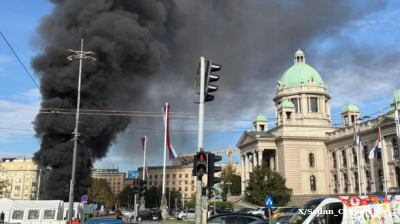The intensification of the pro-Kremlin turn of populist Prime Minister Robert Fico drew the largest crowd of demonstrators to the streets of the Slovak capital Bratislava since protests against Fico's Smer party-led cabinet began in late 2023 as fears arose that Fico’s changes in the country’s police, judiciary and media are following Viktor Orbán’s playbook.
The country’s media estimated about 60,000 took part in the Bratislava rally on January 24, where speakers called on the government “to reject any collaboration with Russia,” while Fico also faces continued turmoil inside his left-right coalition.
Protests backed by civic platform Mier Ukrajine [Peace to Ukraine] and demanding Fico’s resignation with chants “enough of Fico” and “step down” were held across the country and also in other cities in the EU, including Prague, Cracow and Copenhagen.
Ukraine’s President Volodymyr Zelenskiy, whom Fico repeatedly criticised over the long-signalled end of the Russian gas transit through Ukraine and even threatened to cut humanitarian aid to Ukraine, supported the protests when he posted in Slovak “Bratislava is not Moscow” and “Slovakia is Europe” on his X account.
Combined protests drew an estimated 100,000 and were the largest in the last decades, together with the 2018 protests, which chased Fico’s last government from power and the 1989 protests, which brought down the communist regime in then Czechoslovakia.
Just hours before the protests, Fico’s key coalition ally, the conservative centre-left Hlas party, ejected from its ranks Samuel Migal’ and Radomír Šalitroš, two of its four rebelling legislators who have criticised the increasing convergence between Hlas and Smer’s national conservative agenda.
Hlas leader called the two “blackmailers” interested in “power positions” who “infiltrated” Hlas while he “extended his hand” to the remaining two Ján Ferenčák and Roman Malatinec.
In response, the four Hlas rebels issued a statement announcing that “instead of discussion we are observing an increased interest of police and security in us” and that “under such pressure, we won’t be voting” in the parliament. Hlas leader and Minister of Interior Matúš Šutaj Eštok later denied police would subject the four legislators to surveillance.
If Migal’ and the other three abstain from voting, Fico’s ruling coalition from October 2023 is reduced to 75 in the parliament of 150. Junior coalition member far-right SNS is holding talks with another three rebels led by Rudolf Huliak, which prompted Fico to admit for the first time in November that early elections could be on the agenda though he will do his utmost to avoid it.
Speaking for the public broadcaster STVR in a regular political programme Sobotné dialógy Fico reiterated that early elections are a possibility only after Hlas and SNS fail in their talks with rebel legislators. Fico described early elections as “a technical solution” but not “a good political solution.”
“We are watching the collapse of Fico’s fourth cabinet live. The only solution is now early elections,” commented Michal Šimečka leader of the largest opposition party, liberal Progressive Slovakia (PS), on his Facebook social media page.
Smer trails PS by 4.5%, the January poll by NMS shows, but it is not certain PS would be able to form a majority cabinet even if it beat Smer in potential early elections this year.
Last month, former Smer legislator and ex-European Parliamentarian Boris Zala told bne IntelliNews that Fico “wouldn’t have a problem” with joining forces with the surging neofascist Republika party, while Hlas, under the leadership of Šutaj Eštok aligns itself more closely with Fico and his Smer party leadership than was common when Peter Pellegrini set up Hlas as a Smer party offshoot in 2020.
Šimečka also stated that the parliament is now “paralysed” not by “dark forces from abroad,” referring to Fico’s allegations of “a coup” in Slovakia, but “by Fico’s inability to maintain stable rule.”
Last week, Fico alleged “a coup” was supposed to be plotted against his government involving opposition, Mier Ukrajine and “funding from abroad.” His allegations helped him end the no-confidence vote parliamentary session last week after the opposition walked out in protest of moving the session behind closed doors.
Fico referred to the intelligence service SIS report in his allegations without giving details to the public, which only reinforced criticism that SIS had come under the influence of the Smer party. Reports that EU intelligence services stopped sharing information with SIS appeared already last year.
News
_1761147529.jpeg)
China accuses Washington of “bullying” over visa ban threats in Central America
China has sharply criticised the United States for its decision to impose visa restrictions on Central American officials and citizens accused of ties to the Chinese Communist Party, describing the move as evidence of American “arrogance and bias."

Serbian president calls fire, shooting outside parliament a terrorist attack
The attacker, a retired employee of the former State Security Service, opened fire on a tent settlement of pro-government supporters.

Bolivia's new leader must rebuild a shattered economy
Bolivia enters a new political and economic phase as centrist Rodrigo Paz prepares to take office on November 8, inheriting one of the country’s most acute crises since the hyperinflation of the 1980s.

Hungarian foreign minister says "many actors" worked to prevent Budapest summit
The White House has suspended plans for a meeting between US President Donald Trump and Russian President Vladimir Putin in Budapest.



